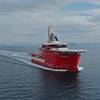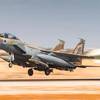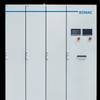AET Names its First LNG-Fueled Aframax Pair
Petroleum and chemical tanker owner and operator AET Tankers has named and welcomed its first LNG dual-fuelled aframax vessels, Eagle Brasilia and Eagle Bintulu.
According to a press release of the Singapore-based company, the ceremony for the vessels was held at the Samsung Heavy Industry Co Ltd’s (SHI) shipyard in Geoje, South Korea. Both vessels have been taken on long-term charterby Shell International Trading and Shipping Company Limited (Shell), primarily for operations in the Atlantic Basin, and will begin operating for the company from Q4 2018.
Using LNG as a fuel eliminates sulphur (SOx) emissions by nearly 100 percent, nitrous oxide (NOx) emissions by 85 percent and particulate matter (PM) emissions by 98 percent, exceeding the International Maritime Organisation’s (IMO) MARPOL VI 0.5% SOx regulations due into force in 2020. The vessels are in compliance with NOx Tier III emission when operating in gas mode.
The vessels are equipped with conventional single screw propulsion with two-stroke main engine, three auxiliary engines and two auxiliary boilers, all equipped for LNG dual fuel capability. LNG fuel is supplied through two type-C tanks of 850 cubic metres each arranged on the main deck aft port and starboard.
Each LNG tank is equipped with two LNG feed pumps which provide full redundancy for operation. The vessels are designed to receive LNG fuel from LNG bunkering vessels (via ship-to-ship transfer). The vessels will be able to trade with LNG fuel for approx. 6,000 nautical miles.
Captain Rajalingam Subramaniam, President & CEO, AET, said: “We welcome these vessels as the first in what will be an expanding fleet of LNG dual fuelled vessels in the years to come, as part of our Group’s Green Sustainability Agenda. This seeks todeliver environmental efficiency alongside operational excellence."
Rajalingam added: "This is a point of critical importance, as ensuring that these LNG dual-fuelled aframaxes are designed to operate with optimum efficiency, the highest standards of safety and compliance has been and remains top priority for us. Under the careful management of our shipmanagement division, Eaglestar, we look forward to ensuring our effort benefits the industry. I would also like to thank the Shell Group, for working with us in this pioneering effort.”










